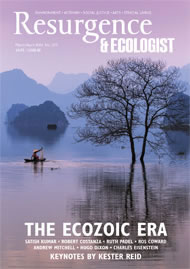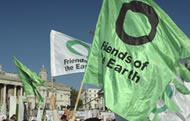We are using more of the planet’s minerals, metals, forests, fuels, water and land than ever before. The environmental damage is increasingly linked with social injustices – from land grabbing and toxic pollution to water shortages and the destruction of fertile land and the seas.
These are big challenges and Friends of the Earth is looking to identify key interventions that can start to put us on a different pathway – away from resource conflicts and the headlong pursuit of economic growth at all costs, towards a greater global quality of life for all.
Over the next 10 years we aim to reshape the UK and EU into economies that rely far less on oil, coal and gas, protect Nature and get consumption under control. Key to this is to understand that the economy should work for people and planet, rather than pitting one against the other.
Given the scale of the challenge, we’re focusing on two key areas:
• How can rich countries reduce their overconsumption of the world’s scarce resources?
• How can we ensure we shift the economy to make the transition to a sustainable use of the world’s resources?
On the first question a key issue has been establishing what the European resource use footprint is in practical terms. We have been working with the Sustainable Europe Research Institute in Vienna to work out an effective way of measuring how much of the world’s resources Europe actually uses. We looked at four different areas to measure: our land footprint, carbon footprint (this considers all global-warming gases), water footprint, and the overall amount of materials we use. All these indicators are consumption-based, i.e. they consider the global amount of resource that we use; for example, land in Paraguay that is used to grow the soya that is fed to European livestock is included.
The European Union as a whole uses around 1.5 times its own land area every year, with 60% of this coming from outside the EU. The UK alone imports more than three times its surface area. This land demand, combined with misguided policies on biofuels and biomass for power stations, means that Europe is helping to drive land grabbing around the world.
But should we be using so much of the world’s land? If not, how can we reduce our land consumption? Options include dietary changes (reducing animal protein, increasing vegetable protein), reducing wastage of textiles (through reuse and recycling), and stopping the dash towards biofuels and biomass. The European Parliament is backing this approach in principle and the Commission is proposing adoption of the indicators, so whilst there is still a long way to go we’re quietly confident that we’re a step closer to getting Europe to measure – and then reduce – its environmental impact.
But however much we try to reduce our resource use, the fundamental issue is that we have an economic system that drives us towards ever-increasing levels of consumption and dogmatically pursues economic growth no matter what. There is fantastic work being done in this area by the likes of Tim Jackson, and we are now focusing on three key interventions that will start to put us on the right path:
Transforming finance
The rapaciousness and short-termism of our finance system have led to ever-widening gaps between rich and poor, and created the enduring economic crisis. But it could be radically transformed and put to work for people and the planet. We’re working in partnership with a wide range of other organisations to find a way through this financial maze and recently staged a major conference called Transforming Finance, which we will now be following up.
Transition to a green industrial policy
We need to develop the industries of the future, not those of the past. The whole economy needs to be green – not just the bits of it that are making clean energy and green technologies. Government needs to have a supportive environment policy, a long-term commitment to decarbonisation, and a green industrial policy. We are working to form a broad coalition to develop and promote this green industrial policy, initially focusing on UK political parties as they develop their manifestos for the 2015 elections. Civil society and progressive businesses have already been lambasting the government for not living up to its promises – we need to help them keep up that pressure.
A focus on quality of life, not quantity of growth
Is it possible to redirect the economy so that it focuses on wellbeing, or quality of life, rather than GDP growth? And not just wellbeing in the UK or Europe, but around the world – with an equitable distribution of the world’s resources? We are only just starting our work in this area and are keen to hear the views of Resurgence & Ecologist readers. Join our Economics and Resource Use programme hub at forum.foe.co.uk/campaignhubs








